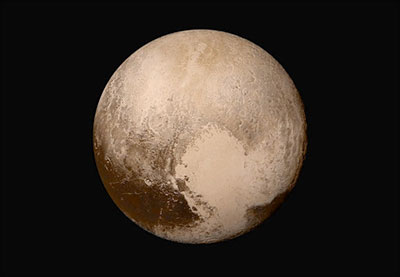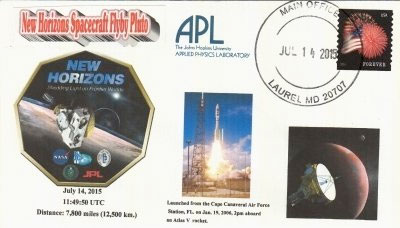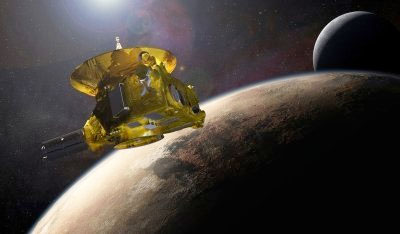|
|

|
|
Author
|
Topic: Space Cover 327: Pluto Has A Heart!
|
stevedd841
Member Posts: 297
From: Millersville, Maryland
Registered: Jul 2004
|
 posted 07-26-2015 06:49 AM
posted 07-26-2015 06:49 AM
   
Space Cover of the Week, Week 327 (July 26, 2015) Speeding to its closest point of approach during what is described in the news as the flyby of Pluto and its Moons, NASA's New Horizons satellite completes a nine and a half year journey through our Solar System to take this remarkable photo in true color on July 13, 2015, only 16 hours prior to its closest point of approach to dwarf planet Pluto and its Moon system (Note: data is corrected from my earlier posting). Traveling at the speed of light over a distance of 3.12 billion miles back to Earth, this missing photo of Pluto is taken by the New Horizons satellite from a distance to Pluto of 476,000 miles / 766,000 km. On its closest point of approach date, July 14, 2015, the satellite will dramatically shave this distance to only 7,800 miles / 12,500 km and will complete our Solar System's family portrait. Transmission of this Pluto photo takes 4 hours and 25 minutes for it to be received at Johns Hopkins Applied Physics Laboratory, Laurel, Maryland, USA. Also noted in news releases by NASA is the appearance on the surface of Pluto of a geographic region with the graphic outline of a heart, an unusual and warm welcome from this icy dwarf planet to us on Earth from the outermost edges of our Solar System. Credit NASA-JHUAPL-SWRI. The flyby of Pluto was noted by friend and space cover collector, Pete Sarmiento, who obtained hand cancels on space covers he made for the historic Pluto flyby event as it was being observed and tracked by Johns Hopkins Applied Physics Laboratory staff. Pete's space covers of the Pluto flyby were appropriately canceled at the Main Office, July 14, 2015, Laurel, Maryland, 20707, USA, on this historic date. Many thanks, Pete, for this space cover of the week! Space Cover #327: Pluto Has A Heart! "Pluto is an absolutely amazing system," comments former NASA Science Division Head and Principal Investigator Alan Stern of the Southwest Research Institute (SwRI), Boulder, Colorado, for the New Horizons satellite flyby of Pluto and its Moons. By way of historical perspective, NASA's Voyager 1 and Voyager 2 satellites completed their Grand Tour of our Solar System in 1989, with Voyager 2 speeding by large planet Neptune and establishing the outer boundary of the Solar System at the time. On these journeys, Pluto was omitted. Now, twenty-six and a half years later, the New Horizons satellite has reset our goal post of exploration at 3.12 billion miles in exploring Pluto and its Moons at the outermost edge of our Solar System and also enabling a further option for the satellite to explore more extreme and remote Kuiper Belt objects and to expand our knowledge of the Solar System. "I think, first of all," Stern remarks in an interview concerning the New Horizons satellite flyby of Pluto, "…there's more interest in Pluto than there was in the (Voyager 2) Neptune encounter, and that's just a fact. Some of that's got to do with Pluto being the farthest frontier. Even when they flew by Neptune, everybody knew Pluto was farther. Secondly, Pluto has a brand. To different people, it's different things. It's scientifically intensely compelling." Stern continues, "Pluto and the Earth have the atmospheres, the seasons, the snows, the climate. The Moon is dry, and by comparison, Charon (largest Moon of Pluto) is dry. It's smaller and grayer. It doesn't have an atmosphere. There are great analogies with the Earth to compare, and they were formed through the same mechanism — a giant impact." He concludes, "For exploration, it's a milestone in human achievement. It will probably be, for a very long time, the farthest thing that's ever been explored…." Not only does Pluto have a heart, we do too!  Artist's rendering of New Horizons satellite at closest point of approach of Pluto with its largest Moon Charon at the satellite's flyby, July 14, 2015. Credit NASA. Steve Durst, SU4379 |
Robert Pearlman
Editor Posts: 45784
From: Houston, TX
Registered: Nov 1999
|
 posted 07-26-2015 07:39 AM
posted 07-26-2015 07:39 AM
   
...this missing photo of Pluto taken by the New Horizon satellite from a distance to Pluto of only 7,800 miles A minor correction: this particular photo showing the full face of Pluto was not taken at closest approach. Rather, it was taken on July 13, about 16 hours before the moment of closest approach when New Horizons was still 476,000 miles (766,000 kilometers) from the planet's surface. |
stevedd841
Member Posts: 297
From: Millersville, Maryland
Registered: Jul 2004
|
 posted 07-26-2015 09:25 AM
posted 07-26-2015 09:25 AM
   
Many thanks for catching this, Robert. Yes, I agree, and have made this correction to the posting. The detail in this photo of Pluto is absolutely amazing. The heart of Pluto by the way is thought to be frozen nitrogen and much of the terrain of Pluto is thought to be comprised of frozen gases including nitrogen, methane, and carbon monoxide. This is a remarkable photo of Pluto in all respects. |
Bob M
Member Posts: 1783
From: Atlanta-area, GA USA
Registered: Aug 2000
|
 posted 07-26-2015 10:59 AM
posted 07-26-2015 10:59 AM
   
Great cover and cancel, Pete, and good to see it posted here, Steve. As far as my covers for the Pluto fly-by, I'm sorry to say I mostly missed the boat. Because of reports that the Laurel, MD post office might be iffy about supplying/applying cancels to covers mailed in for the fly-by, I sent my covers instead to Pasadena, CA, the location of JPL. With JPL managing the three Deep Space Network antennas, it is a relevant location. But now after over 2 weeks my covers sent to the Pasadena post office have not returned, so don't know what to expect from there. I didn't do my homework and failed to consider several other appropriate locations for Pluto fly-by cancels. An excellent choice would have been Flagstaff, AZ, the location of the Lowell Observatory, where Clyde Tombaugh discovered Pluto 85 years earlier. Hopefully, other collectors will have done better than me and we will see some other well-done Pluto fly-by canceled covers here soon. |
micropooz
Member Posts: 1577
From: Washington, DC, USA
Registered: Apr 2003
|
 posted 07-26-2015 11:47 AM
posted 07-26-2015 11:47 AM
   
Like Bob, my efforts to get covers did not work out either. I left covers off at the Simpsonville, MD post office (actually the closest PO the APL campus). They sent them in to Baltimore for a sprayed-on Baltimore postmark. Yuck! |
Antoni RIGO
Member Posts: 216
From: Palma de Mallorca, Is. Baleares - SPAIN
Registered: Aug 2013
|
 posted 08-02-2015 04:11 AM
posted 08-02-2015 04:11 AM
   
Guys, I was lucky in my second attempt to obtain covers cancelled in Robledo de Chavela (Madrid) commemorating the Pluto flyby of New Horizons spacecraft.
Here, one of six covers received, maybe the best one postmarked.  As known, Robledo de Chavela (Madrid) is the nearest post office from MDSCC -Madrid Deep Space Complex Center-, one of three NASA complex from DSN and the only one installed in a country not English-speaking (unlike USA and Australia). |
Bob M
Member Posts: 1783
From: Atlanta-area, GA USA
Registered: Aug 2000
|
 posted 08-04-2015 11:30 AM
posted 08-04-2015 11:30 AM
   
Congratulations, Antoni, on your covers for the Pluto fly-by from Madrid, Spain, one of the three Deep Space Network (DSN) antenna stations receiving data from New Horizons.JPL, in Pasadena, CA, manages the DSN of three antennas (in Madrid, Canberra, Australia and Barstow, CA) and because of its relevancy to the New Horizons Pluto fly-by mission, some of us sent covers to be canceled at Pasadena. Exactly three weeks after the fly-by, my covers came back from the Pasadena post office and were canceled correctly but not with perfect impressions. But no matter, it's good to have them and to add them to what looks like may be a relatively small number of covers cancelled for the historic Pluto fly-by on July 14.  The cover at the top is a New Horizons launch cover canceled from Cape Canaveral and now, 9 1/2 years later, canceled at Pasadena for the Pluto fly-by. The cover below it is an Artcraft Copernicus FDC, autographed by James Christy, the discoverer of Pluto's first moon, Charon, and now canceled for when New Horizons whizzed by the Pluto system. Christy added both the date he discovered Charon, 22 June 1978, and the date he signed the cover, 2 Aug. '78, which was less than a month and a half after his discovery. Hopefully, we'll be seeing more Pluto fly-by covers here. |
Antoni RIGO
Member Posts: 216
From: Palma de Mallorca, Is. Baleares - SPAIN
Registered: Aug 2013
|
 posted 08-04-2015 02:11 PM
posted 08-04-2015 02:11 PM
   
Bob, thanks for your kind words.I thought that covers postmarked in Pasadena come out in hundreds or thousands of copies, but now maybe I was wrong. Your covers are excellent too. Your combo cover for New Horizons launch and Pluto fly-by is very desirable as well. And adding a Pasadena postmark for Pluto fly-by to your Artcraft cover with James Christy signature is a nice reproduction on what Astrophilately can explain. Thanks for sharing with others. |
fimych
Member Posts: 229
From: Boston MA, USA
Registered: Jun 2015
|
 posted 08-19-2015 08:43 AM
posted 08-19-2015 08:43 AM
   
Thanks gentlemen for the interesting covers. I got this one recently, although it's not my subject, I decided to keep it. Nothing special, but the interesting thing - it was cancelled in INTEL ISEF, Pittsburgh PA - the student achievements fair. The project was designed and developed by students of several universities in cooperation with NASA. |
rvk
Member Posts: 20
From: Highlands Ranch, CO USA
Registered: Jul 2020
|
 posted 03-05-2021 04:32 PM
posted 03-05-2021 04:32 PM
  
Since I am new to this forum, I am now adding my two Pluto New Horizons covers to the list. The first cover was cancelled in Boulder, Colorado, where the Principal Investigator for New Horizons, Alan Stern, has his office at the Southwest Research Institute (SwRI). The second cover was cancelled at Flagstaff, Arizona, which is home to the Lowell Observatory where Pluto was first discovered in 1930 by Clyde Tombaugh.  
|
micropooz
Member Posts: 1577
From: Washington, DC, USA
Registered: Apr 2003
|
 posted 03-05-2021 05:18 PM
posted 03-05-2021 05:18 PM
   
Welcome to the forum, rvk!And cool New Horizons covers!!! |
Ken Havekotte
Member Posts: 3181
From: Merritt Island, Florida, Brevard
Registered: Mar 2001
|
 posted 03-09-2021 06:49 PM
posted 03-09-2021 06:49 PM
   
Good to see another favorite planetary space probe of mine posted here of the nuclear-powered New Horizons first voyage to Pluto and the Kuiper Belt, that got started from the Cape in 2006. Since leaving Earth, it has become one of the fastest traveling space crafts to date. As time permits, I'll try to assemble a bunch of different New Horizons postal covers, cancel types, along with some unusual issues as well. Some of them need to be re-located at the moment, though, but all of those posted above are good samples of the different cachet and cancel types. One of those that Bob had posted was a joint cachet or partnership effort of my own firm. But for now, with the current interest in Pluto and Charon, I thought it would be appropriate to depict some covers, along with a letter and signed photo, of where it all got started from with Pluto more than 90 years ago from last month.  The first display panel highlights autographed material by Pluto discoverer Clyde Tombaugh (1906-1997) and James Christy, the American astronomer credited with the discovery of Pluto's largest moon, Charon. I see that Bob has already included a signed first day cover by Christy, the same type as mine, in his posting above.  The second display presentation is a multiple assembly of planetary, deep space, and space science postage stamps of our country within nearly two decades from 1991-2016. It's interesting to note that the 8 different single pane release Forever stamps first day issue, "View of Our Planets," in May 2016 does not include Pluto. Pluto had been re-classified as a dwarf planet in 2006 as part of a dwarf binary planet system, the only one in the solar system. Charon, about 750 miles in diameter, is half the size of the icy cold "planet" Pluto, but doesn't meet a major criterion as a full planet acceptance by astronomers and planetary scientists worldwide. The unmanned deep space probes of the Pioneer and Voyager series are perhaps my all-time favorites. But I would love to see more covers illustrated here in commemoration of them along with so many other spacecraft programs of deep space exploration, such as Kepler, Juno, and Cassini-Huygens. But with the Hubble Space Telescope, while only in Earth orbit, is a separate and distinct category all by itself. |
Bob M
Member Posts: 1783
From: Atlanta-area, GA USA
Registered: Aug 2000
|
 posted 03-10-2021 06:02 AM
posted 03-10-2021 06:02 AM
   
Looking forward to more covers and info, Ken, as you mentioned about New Horizons, etc. Also great letter from Tombaugh who was very accommodating about autographing during his long 91-year life. But perhaps best that he didn't live long enough to see his discovery removed from its planetary status. | |
Contact Us | The Source for Space History & Artifacts
Copyright 2021 collectSPACE.com All rights reserved.

Ultimate Bulletin Board 5.47a
|
|

|
 advertisement advertisement

|





















